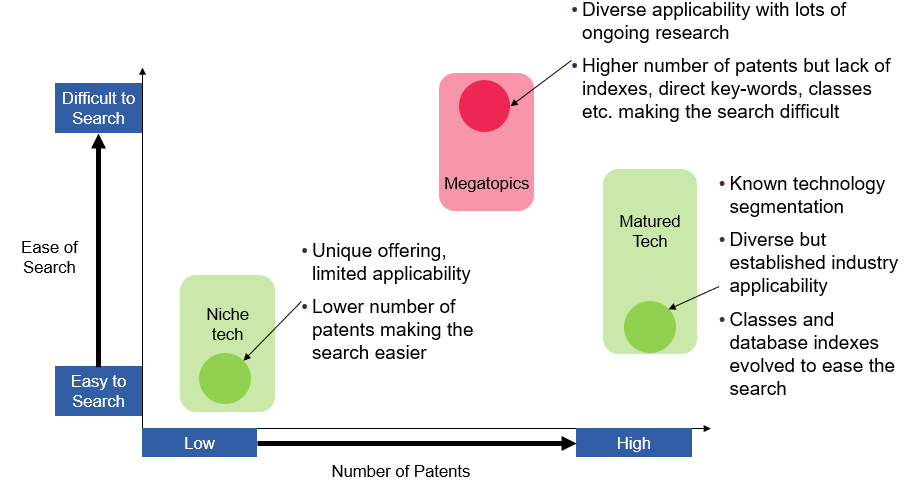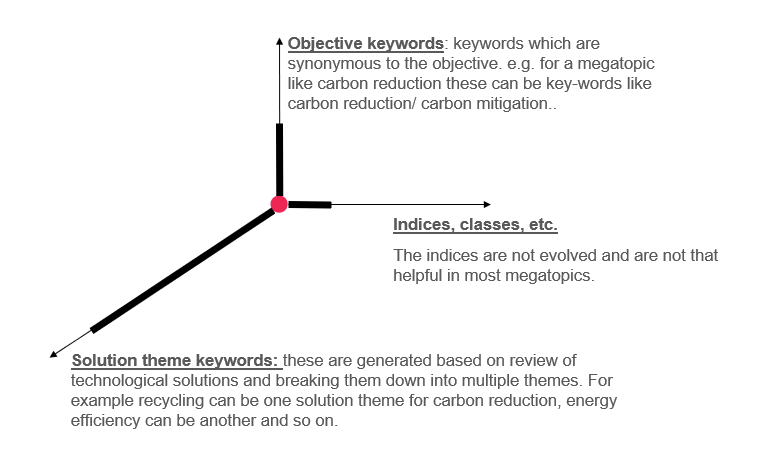You need to conduct a patent search on sustainable technology, products for elderly or any other megatopics—Difficult? Impossible? While technology has improved patent search efficiency, megatopic searches such as in areas like elder care, digitization, climate change and remote working require in-depth understanding of the domain and human expertise that currently cannot be matched by the technology/ automated offerings. Diverse applicability with lots of ongoing research but lack of available database indexes and classes make megatopic searches challenging. In this blog post, Urs Dommann and Mahadev Prasad Yadav explain the challenges and approaches for megatopic searches.
Let us paint a picture for you of a day in the life a patent specialist. Our hero, Pat Specialist is at her desk, working away on searches. Her manager returns from meetings with a clear order to focus the company strategy on a megatopic. As the name suggests, megatopics are wide and deep topics with diverse applicability such as the elderly population, digitization, climate change and remote working.
In this case, Pat’s manager nonchalantly drops a task on her desk to conduct innovation scouting or patent landscape in the field of solutions for the elderly population, blissfully unaware of what that search will involve. Pat wants to run a keyword or classes search, but soon realizes that not even the best of the best databases can help her with this search. What should Pat do? As we will discuss, she has a number of tools and strategies at her disposal.
Have technology transformation and database offerings improved search efficiency for all domains/topics?
The advent of machine learning, artificial intelligence technologies, database indexes and the digital evolution in patent classification systems have transformed the patent search and analytics process. This transformation has enabled a patent searcher to conduct searches efficiently and has also eased patent monitoring.
A detailed assessment of the multiple topics with regards to classification codes and database indexes reveals that the technology, database indexes, and digital evolution has improved efficiency for select domains, especially the matured technology domains. For most matured technology domains, there are established indexes like CPC classes, F-Terms, Chemical Codes, Index terms, and CAS numbers which make the search relatively easy. Moreover, there’s knowledge available about key-innovators, geographies, innovation themes, etc. through review papers, domain portals, etc. All of this helps establish the search criteria faster with higher precision and helps establish the innovation patterns for regular innovation monitoring activities making the task of the searchers easier.
What about searching niche topics or megatopics?
For topics such as those outlined in Figure 1, are the artificial intelligence technologies and database indexes even applicable here?
Figure 1: Exemplary Megatopics
Well, this can be very challenging for most megatopics due to simple objectives, complex problems/ roadblocks or dependencies and multiple solution themes. Many times the patent may not even disclose the objectives but might focus heavily on the solution. Moreover, there are no specific patent classifications available and database indexes have not evolved sufficiently for these topics. In summary, patent searching in megatopics is challenging because of the following:
- Lack of consolidated expertise
- Direct keywords for objectives/topic in general do not help
- Poor citation networks
- Lack of established classes like CPC/IPC, database indexes, etc.
- No clear competitors and lack of clear boundaries, as everyone is trying to find their sweet spots
How difficult is it to conduct patent searches in megatopics compared to other topics/domains?
To put this into perspective, a comparative assessment of megatopics with niche and matured topics is depicted in Figure 2 with regards to corresponding number of patents and ease of search. This helps us understand where megatopics stand with regards to ease of search compared to niche and matured technologies.
Figure 2: Number of Patents and Ease of Search Megatopic Patent Searches
Figure 2 depicts the relative difficulty of patent searches in megatopics where the number of patent documents are on the higher side. In these cases, there is no direct way to conduct/ focus the searches. These searches are especially difficult as there isn’t support for conducting keyword neutral searching (for example, searches based on database indexes, classes, etc.) and keyword-based searches are tricky due to complex problems and multiple solution themes. Therefore, the conventional patent search approaches give poor recall compromising the insights for informed decision making.
How to approach the patent search for megatopics
Let’s again look at how a search is typically approached. It starts with breaking down the search objectives into multiple concepts and gathering synonyms for the concept, classes and other indexes applicable for the search. However, this is not possible for megatopics due to the reasons mentioned above.
Contrary to the usual search approach, our patent search hero Pat will need a complex and multi-dimensional approach to ensure adequate search quality in megatopics. In addition to the problem/ objectives (e.g. reducing carbon emission, elderly population care), Pat will need to find out the solutions/ solution themes while constructing her search strategies. As a result, Pat needs to first conduct the search based on the objectives, understand the domain and identify the potential solutions/ solution themes and subsequently construct inclusive search strategies incorporating the solution themes.
Figure 3 provides a pictorial view of the multi-dimensional approach required. As depicted in this figure, the more the solution themes are explored, and keywords are added to the search, the more comprehensive the search will become. This explains why human expertise is required to adequately cover a megatopic.
Figure 3: Multidimensional approach for successful megatopic search
As illustrated in figure 3, a megatopic search must incorporate solution themes in the search to achieve complete and accurate results. Therefore, human interpretation and expertise have a major role to play in such searches to provide data driven actionable insights in such domains.
Megatopic searches may be difficult, but they are not impossible. Our hero Pat is an essential human component to the multi-dimensional approach required. Ensuring that she has the tools- as well as the expertise required- is the key to a successful megatopic search.
For more information about how Evalueserve has supported clients in the elder care and carbon reduction domains, contact us to find out how we can help support your mega topic search with our mind + machine™ approach.
Related resources:






